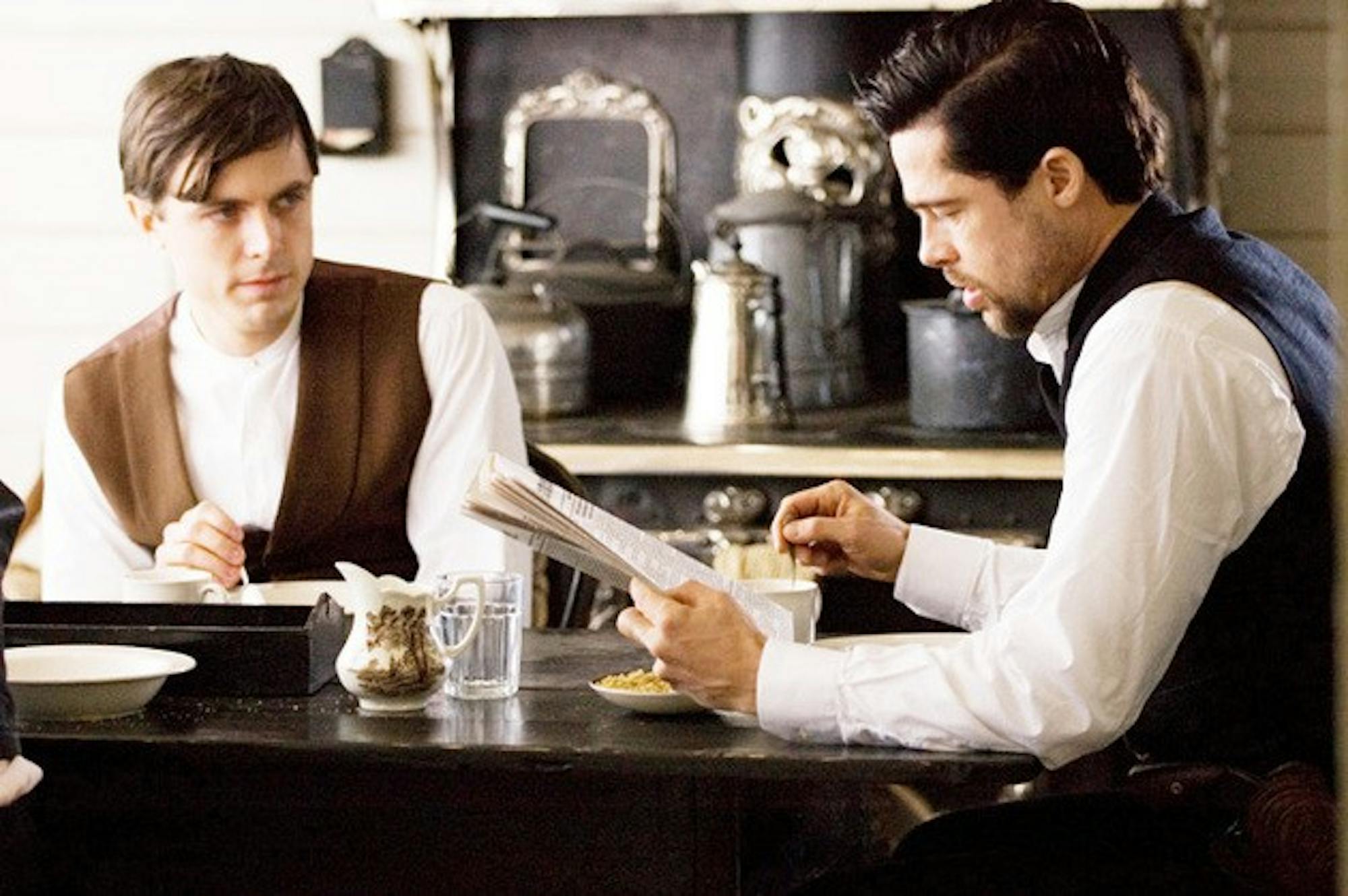Imagine a movie that stars Brad Pitt as the legendary outlaw Jesse James. Now take all the expectations you might have for such a film and turn them inside out. That's the best way I can think to describe "The Assassination of Jesse James by the Coward Robert Ford." The film contains no shootouts, no high-speed chases, no showdowns in dusty saloons -- nothing you might expect from a story about America's most notorious bandit. Instead, it offers nearly three hours of quiet, contemplative drama punctuated by seemingly endless shots of wheat fields and cloud formations. By turns fascinating and frustrating, "Assassination" isn't a very successful film, but it's one of the most interesting failures I've seen in a while.
The movie opens with a train robbery -- a scenario ripe for plunder by a more thrill-seeking film, here executed with such symphonic elegance that it plays almost as a love scene. Brad Pitt strides out of the darkness, the lower half of his face masked like the highwayman from some dime-store pulp novel. It takes a moment to realize that we are dealing not with parody, but mythology; as played by Pitt, James is an American demigod, iconic to a fault. We are given glimpses into the outlaw's future, when he lives retired under an assumed name, constantly on the lookout for assassins real and imagined. Eminence, it seems, has given way to paranoia.
But back to that train robbery. Short on numbers, James and his gang have recruited a band of local delinquents to help them execute the heist. Among these men is Robert Ford (Casey Affleck), a simpering sycophant who has been raised on tales of Jesse James and who leaps at the chance to ride alongside him. A hopeless misfit, Bob has learned to bandage his ego by obsessively cataloguing the various similarities between him and his boyhood hero. He recounts James's exploits with such a tone of infatuation that he eventually demands, "Do you want to be like me, or do you want to be me?"
Bob convinces James to let him stay on after the train robbery, along with his brother Charley (Sam Rockwell). The two of them are introduced to the rest of the gang, which includes Dick Liddel (Paul Schneider), a handsome, sweet-talking thug, Ed Miller (Garret Dillahunt), a sweaty-palmed schemer, Wood Hite (Jeremy Renner), James's upstart cousin;and James's brother Frank (Sam Shepard), who robs with zeal but doesn't condone James's violent tendencies.
The narrative soon mires itself in a complicated network of deception and betrayal, but the ensuing subplots are really just window-dressing for an incontrovertible truth at the center of the film: Bob Ford is madly in love with Jesse James. The homoerotic tension between these two men, unacknowledged but unmistakable, drives the movie forward toward its foregone conclusion. Ford kills James for the same reason that he takes up with him in the first place: He wants to become the same kind of populist legend that his idol represents.
Saturated with beautiful sepia tones, "Assassination" is a wonder to look at. At its best, the movie is a hypnotic play of light and shadow, set against the stark beauty of the American West. It's all pretty amazing stuff, so much so that I quickly began to wonder why the film wasn't really coming together. The problem is not that it's boring; when a movie gives away the big finish in the 10-word-long title, chances are it's not trying to entertain via suspense.
No, the failure of "Assassination" lies in the film's self-indulgence. Director Andrew Dominik has an impressionist's eye for natural beauty -- not since Terrence Malick's "Days of Heaven" has a wheat field been so gloriously photographed -- but he gets in his own way, employing ill-advised camera gimmicks to keep things interesting. Nestled in the sumptuous imagery were sequences so fuzzy and distorted that I initially mistook them for dream sequences.
Dominik also adapted the screenplay from Ron Hansen's novel, and he seems intent on cramming in extraneous plot details that don't feel fully realized onscreen. The film isn't tedious, exactly, but for all its poetic refinement it feels curiously overstuffed. Many of the scenes work as self-contained vignettes, but they exist in isolation from a movie that seems unsure how to convincingly include them. Some characters, like Sam Shepard's venerable outlaw, vanish just as they begin to get interesting; others, like Zooey Deschanel's winsome feather dancer, show up out of nowhere and disappear just as quickly. Dominik tries to pave over some of these gaps with an explanatory voiceover (voiced by Hugh Ross), but the narration is so bland and toneless that it sounds cribbed from a History Channel documentary.
I suspect there is a magnificent movie underneath these excesses. It's hard to be sure. But what we're left with instead is a confounding, captivating mess. I can't really recommend the film -- it's too shapeless and strange to really work on any plausible level -- but a small part of me hopes you'll disregard my advice and see it anyway.




![HONEYJOON_[Ines Gowland]_4.PNG](https://snworksceo.imgix.net/drt/7af2efc8-1bd1-4001-b754-e2718ce663b8.sized-1000x1000.PNG?w=1500&ar=16%3A9&fit=crop&crop=faces&facepad=3&auto=format)